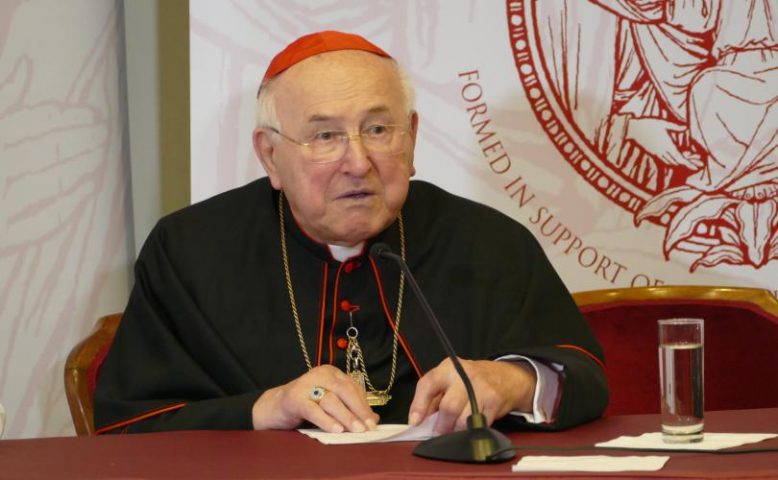There Are No Exceptions, Mr. President, by Judie Brown
May 20, 2019Founder’s Quote
May 21, 2019
By Lianne Laurence, LifeSiteNews, May 17, 2019
 ROME, Italy, May 17, 2019 (LifeSiteNews) — The Church of England’s endorsement of contraception at its 1930 Lambeth Conference has led to the “diabolical monstrosity” of “procreative medicine,” German Cardinal Walter Brandmüller told the Rome Life Forum on Friday (read full talk below or here).
ROME, Italy, May 17, 2019 (LifeSiteNews) — The Church of England’s endorsement of contraception at its 1930 Lambeth Conference has led to the “diabolical monstrosity” of “procreative medicine,” German Cardinal Walter Brandmüller told the Rome Life Forum on Friday (read full talk below or here).
It also led to the American Protestant Federation of Churches collectively endorsing contraception in 1961 as “morally justified if the motives are just,” and essentially obliged the Catholic Church to “tackle the matter of contraception” at the Second Vatican Council, Cardinal Brandmüller said in an address delivered in Italian on “The Prehistory of Humanae Vitae.” His talk was given in Rome at the Pontifical University of St. Thomas Aquinas (Angelicum).
By that time, a “number of Catholic theologians, to a greater or lesser extent” had also endorsed contraception, and the “concept of situational ethics” on which that position is based had “penetrated Catholic moral theology,” said Brandmüller, a dubia cardinal and president emeritus of the Pontifical Committee for Historical Sciences.
Thus Pope Paul’s 1968 encyclical Humanae vitae reaffirming Catholic teaching, which had been affirmed by Pius XI in Casti Connubii and by Pius XII and John XXIII, that contraception is intrinsically evil, “triggered a fierce storm of protest within the Church.”
The acceptance of contraception — which separates the sexual act from procreation — has now resulted in practice of “procreative medicine” — in-vitro fertilization, genetic engineering, eugenic prenatal screening, abortion — in which “man has seated himself on the throne of the Creator,” Cardinal Brandmüller said.
Practitioners of reproductive medicine carry out experiments that “sacrilegiously violate the sanctity of human life” and interventions “of an almost diabolical monstrosity, today heralded as spectacular breakthroughs,” he observed.
“We hope for a renewed reception, adoption and more profound transmission of the truly prophetic teaching of Paul VI in our days,” the cardinal concluded.
***
Talk by Cardinal Walter Brandmüller
Give at Rome Life Forum, Rome, May 17, 2019
Pontificia Università di San Tommaso d’Aquino (Angelicum)
An insight into the pre-history of Humanae vitae
Last year we commemorated Pope Paul VI’s Encyclical Humanae vitae, published in July 1968, in the midst of the cultural revolution in that year.
Among other things in this encyclical, Paul VI put an end, in doctrinal terms, to disputations pursued with great fervor even within the Catholic Church on the lawfulness and moral reprehensibility of artificial contraception. The encyclical therefore triggered a fierce storm of protest within the Church.
The matter became a subject of controversy in the Catholic world when, at the 1930 Lambeth Conference, the Church of England reached a decision, based on a vote of 193 in favor and 67 votes against, entirely in keeping with the secular spirit of the time, in favor of contraception. The first person to be open to neo-Malthusian propaganda after the First World War was probably the Anglican Bishop of Birmingham, Russell Wakefield. Conversely, in 1920 the Lambeth Conference — the Church of England’s assembly of Bishops — decisively opposed any attempt to put forward medical, financial or social justification for birth control.
Nevertheless, a poll of priests showed that half of the lay people interviewed did not use contraceptives, while the other half used prophylactics or coitus interruptus. However, the personal physician to the head of the Church of England, Lord Dawson di Penn declared, in contradiction of the decision of the 1921 Lambeth conference, that birth control should not be refused from either a medical or an ecclesiastical standpoint. Hence a barrier had been broken down and the Anglican Church assumed a leading role in influencing opinion in the non-Catholic world.
At the beginning however, this was not the case. Eminent representatives of Lutheranism and the Methodist Episcopal Church South saw in contraception one of the “most repugnant modern travesties”, a return to morally ruinous paganism. On 2 April 1931 The Presbyterian wrote as follows on the adoption of the Lambeth Resolution by the USA Federal Council of Churches: “Its recent pronouncement on birth control should be sufficient cause, even if there were no others, for the withdrawal of its support from that body, which declares that it speaks for the Presbyterian and other Protestant Churches in ex cathedra pronouncements.”
Surprisingly, on 22 March 1931 the Washington Post joined with the protests against the adoption of the Lambeth decision: “Carried to its logical conclusion, the [Lambeth] Committee’s report, if carried into effect, would sound the death-knell of marriage as a holy institution by establishing degrading practices which would encourage indiscriminate immorality. The suggestion that the use of legalized contraceptives would be ‘careful and restrained’ is preposterous.”
The Encyclical of Pius XI, Casti connubii, published on 31 December 1930, which presented the Catholic position with great clarity, met with an impressive ecumenical consensus.
However, this fortuitous period came to an abrupt end. In spite of the Encyclical, disputations multiplied, in the Catholic world also, to be interrupted only by the Second World War. A number of Catholic theologians, to a greater or lesser extent, endorsed the position of the USA Federal Council of Churches and its resolution of 23 February 1961:
The majority of Protestant Churches regard contraception and periodic abstinence as morally justified if the motives are just. It is generally believed by Protestants that the motives, rather than the methods, constitute the principal moral problem, providing that the methods are limited to the prevention of conception. Protestant Christians are in agreement in condemning abortion and any method which destroys human life, unless the health or life of the mother is at risk.
The fact that behind this statement was the concept of situational ethics cannot be ignored: illustrious names such as J. Paul Sartre, Albert Schweitzer, Martin Buber and finally A. T. Robinson denied the existence of permanently binding moral standards. This idea then penetrated Catholic moral theology.
These, in broad terms, were therefore the circumstances under which the Second Vatican Council was obliged to tackle the matter of contraception. During the debates, Catholic voices were raised in the Council chamber calling for endorsement of the American Protestant position described above.
The ingenuity with which Cardinal [Leo] Suenens [of Belgium] believed he could compare the development of modern contraceptives to the discoveries of Galileo Galilei is to be noted.
We also recall in this regard the warning from Cardinal Suenens — in fact the spokesperson of Döpfner, Alfruk and Hélder Câmara, The Rhine flows into the Tiber — issued with terrible pathos to the Council fathers, that the Church should not, for the love of God, create a new Galileo case, by once again opposing the discoveries of modern science through its refusal of contraception, an utterance which certainly failed to demonstrate any great knowledge of the Galileo affair.
Today however, we are confronted with the results of a process of erosion initiated at the 1930 Lambeth Conference which, from the approval of artificial contraception, has led us to the monstrosity of what is today known as procreative medicine, by which man has seated himself on the throne of the Creator.
Goethe’s Prometheus said: “I am here and I create men in my image …”.
These words, written more than two hundred years ago, in fact mirror this notion of self which, today, is driving the protagonists of so-called reproductive medicine to carry out these experiments, through which they sacrilegiously violate the sanctity of human life. These are interventions — and there are almost no words to describe them — of an almost diabolical monstrosity, today heralded as spectacular breakthroughs … It only remains for us to wait until these Prometheic persons arrive at the same destiny as their mythical hero.
It is therefore, and in the context of these circumstances, that tribute should be paid to the Encyclical Humanae Vitae published in 1968, a doctrinal document whose prophetic nature has, over time, also been acknowledged by leading non-Catholic thinkers. One of the most illustrious of these was Max Horkheimer, first among the leaders and then among the critics of the Frankfurt School, who allied himself with Paul VI. The journalist Malcolm Muggeridge, at that date still a Communist, gave a favourable welcome to the Pope’s Encyclical.
In this encyclical, Paul VI brought temporary closure to a series of doctrinal affirmations on the matter of contraception, instigated by Pius XI in Casti Connubii and continued by Pius XII and John XXIII. These were ultimately taken up, developed and deepened by John Paul II.
Humanae Vitae provides an extraordinary example of the workings of the process of parodosis, which means transmission of the doctrine of the Church. When the truth of faith is received, adopted and transmitted, what happens is that what is received, when adopted and transmitted, responds with deeper understanding and more precise expression to the needs of the respective present, while continuing to be identical to itself. In all of this, contradiction between yesterday and today is impossible: it is the Holy Spirit who acts in the Church of Jesus Christ to guide this process of paradosis. It is the Holy Spirit who ensures that the faith of the Church develops in the course of time, just as an adult person continues to be identical to the infant it was in the past, an intuition formulated by Vincent of Lérins as early as 430 and elaborated upon by Blessed John Henry Newman.
*
Today, we hope for a renewed reception, adoption and more profound transmission of the truly prophetic teaching of Paul VI in our days.





 ROME, Italy
ROME, Italy

